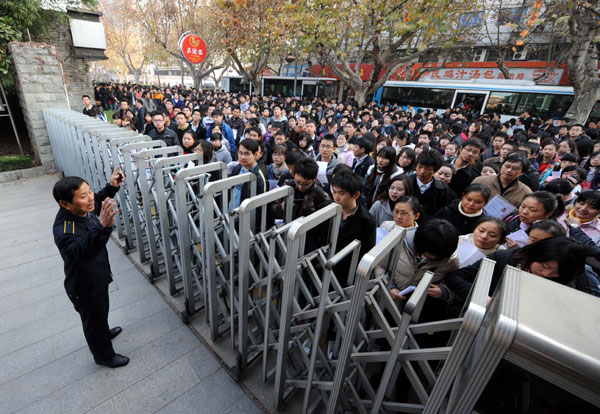Society
1.4 m take national civil servant exam
By Chen Xin (China Daily)
Updated: 2010-12-06 06:59
 |
Large Medium Small |
|
 A staff member of the testing center for the national civil servant examination explains the procedures to a crowd of applicants in Nanjing, capital of Jiangsu province, on Sunday. [Sun Can/Xinhua] |
BEIJING - The number of examinees taking the national civil servant examination on Dec 5 declined for the first time since the test was created in 1989, although more than 1 million people still took the test, a top State Administration of Civil Service official said.
| ||||
While this year marks the first-ever decline in the number of examinees, it is also the third consecutive year they have numbered more than 1 million.
Nie Shengkui, director of the examination and recruitment department of the State Administration of Civil Service, told Xinhua on Sunday that 1.03 million people took the examination. Last year, it was 1.04 million.
Nie suggested three reasons for the declining interest in the exam. First, the improving economy offers more opportunities. Second, people are becoming more rational about applying for posts. Third, about 85 percent of central and provincial-level government jobs require at least two years' work experience.
In addition, switching jobs is coming at a higher cost to opportunity, he said. The number of applicants who already have jobs is only 150,000, he added.
A total of 137 departments and institutions seek to recruit 16,000 civil servants - about 1,000 more than last year. That means an average of 64 examinees are competing for every position.
For the first time, the government increased the age limit for graduate student applicants with master's degrees and PhDs from 35 to 40. There were 575 applicants aged between 35 and 40.
In addition, the government opened up civil service jobs reserved for farmers and workers in customs, taxation departments and railway police stations at the county, township and village levels. Now, 62 farmers and workers are qualified to apply for the 14 vacancies.
Another 5,494 university graduates applied for 108 posts as village heads. The central government has been encouraging educated people to work as rural leaders to assist the countryside's development.
Nie also said this year marked the first time more women than men took the exam, with the ratio of men to women standing at 0.97 to 1.
The results will be released in January, and those who pass will be interviewed. The recruitment process will last until the end of March.
The most sought after single job was with the National Energy Administration. It attracted 4,961 applications, government figures show.
Many people believe civil service jobs are stable, provide many benefits and are comparatively easy.
Although about 85 percent of the vacancies require at least two years of experience at the grassroots level, university graduates are still seeking to fill them.
Cao Hui, a 23-year-old Beijing International Studies University graduate, said she took the exam because the job market is not good.
"A government job is stable and decent, especially now, when job market competition is fierce. I don't expect to be enrolled but still want to try my luck," she said.
Chen Xiaoxia, who works for a company in Beijing, said this year was her second time taking the exam.
"I used my spare time to prepare," she said.
"Many people around me have also applied for civil servant positions, because they want stable jobs. I'll encourage my younger brother and sister to take the exam before they graduate from university."
Liu Xutao, a professor at Chinese Academy of Governance, said part of the reason civil service posts are so popular is the government controls many resources.
"When the government has more resources, enterprises - more precisely, the market - will have fewer," he said.
It is different, he said, from the 1990s - a golden time for private business development - when many government officials resigned to become entrepreneurs.
Liu also said it is commonplace for a country's government to lure talent into its civil service, but he warned that will mean fewer qualified candidates will be available to prop up a market-oriented economy.
"Maybe it's not good that people rush to get government jobs because civil service does not directly create production value," he said.
Instead, applicants, especially college graduates, should turn to a technology- and skill-oriented labor market, he said.
"White-collar jobs can't absorb all graduates," he said.
Cao Yin contributed to this story.



